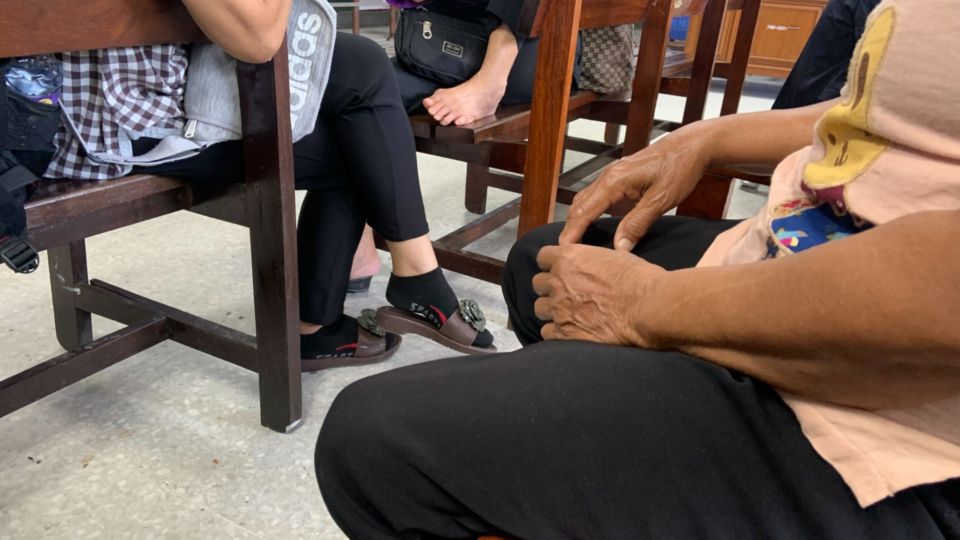This is the third in a series of stories by Coconuts Bangkok about modern day slavery flourishing across borders in Southeast Asia. Read the first and second.
When Dew arrived for a Tuesday morning hearing to the Criminal Court an hour before it opened, it was already packed with other defendants.
They were Thai nationals who, like her, were rescued abroad from traffickers who forced them to commit crimes against their compatriots under threat of violence, only to be prosecuted once they were safely home.
The 30-year-old native of Nakhon Ratchasima province, and another 20 or so trafficking victims including a man named Nop whose ordeal we have written about, were there for another mandatory appearance, hoping this would be the last.
Dew and Nop and all the others went from “victims” to “suspects” the moment they made it home. They have been charged with a range of serious crimes including money laundering and conspiring to commit transnational organized crimes, which could see them returned to captivity, this time by the state, for years to come.
“It’s more like adding insult to our injuries,” said Dew, who spoke on condition of anonymity. “We suffered terribly when we were in Cambodia, and now we’re facing serious charges, despite the fact that we’re the victims.”
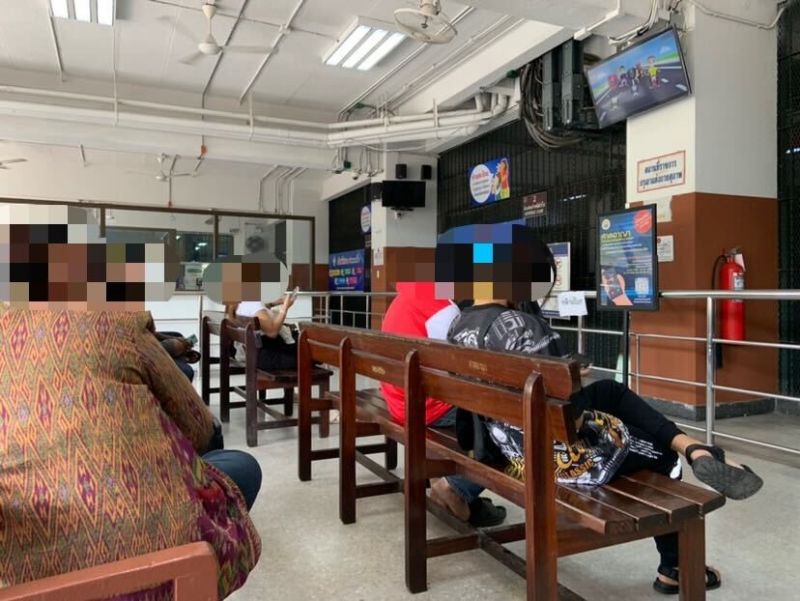
Nop, 40, left his home in Sukhothai province with his 66-year-old mother for an overnight bus ride to Bangkok for his mandatory appearance on Oct. 25.
“I cried until there were no tears left,” said his mother, who asked only to be identified as Wong due to the social stigma associated with the allegations. “Now he is facing charges like money laundering, but authorities do not look at the fact that he was tricked, beaten, and forced to do these things.”
Part Two: Thai man rescued from captivity abroad now faces prison at home
Wong endured six months without word from Nop while he was sold between the Chinese gangs in Cambodia who lured him there with the promise of a good office job. She added that her suffering over his abduction, abuse and forced servitude have been compounded by a flawed legal system.
Susceptible to the scam in the first place because of their economic need, they had to borrow money to pay Nop’s THB100,000 bond (about US$2,700), and now he can’t find a job because of the charges.
Since August, Dew has been wearing an electronic monitoring device while awaiting trial. She could not pay the THB100,000 bond and also struggles to find full-time work. She helps her mom sell somtam, or spicy papaya salad, in her hometown in Nakhon Ratchasima’s Bua Yai district to get by.
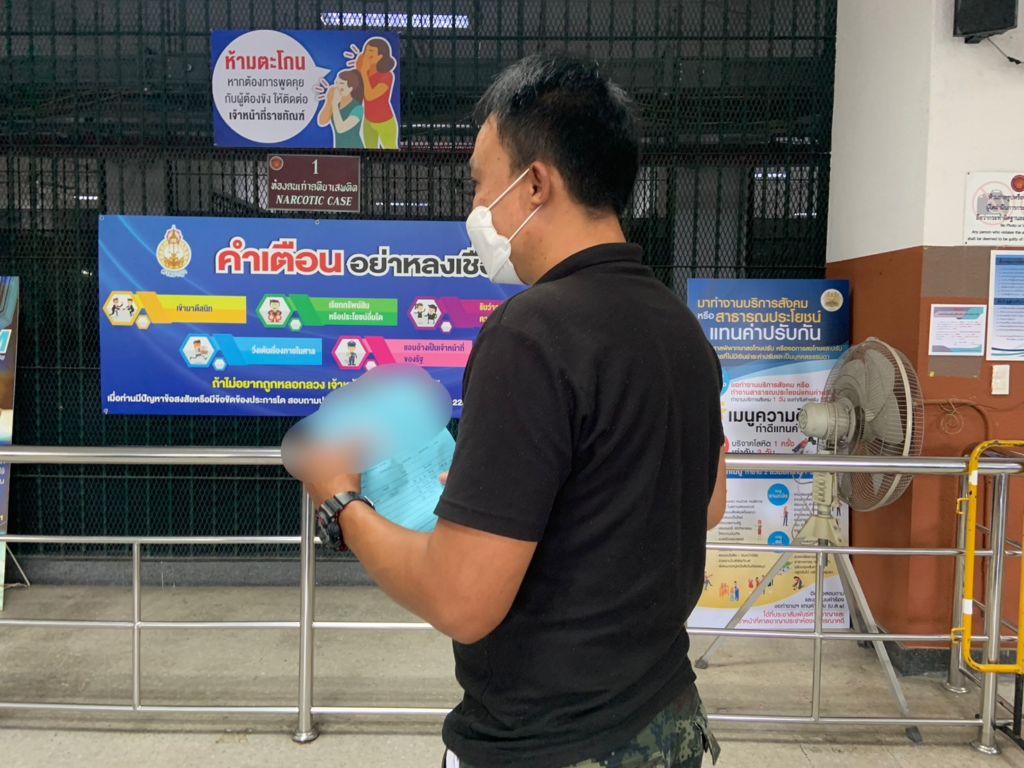
Chasing opportunity
In March, Dew was contacted by an acquaintance who claimed that her boyfriend was a Chinese businessman. Dew was offered work as a “salesperson” in Cambodia and promised a monthly salary of US$1,000.
It took only seconds for Dew – who was fired from her full-time job during the pandemic – to say yes.
“Of course I was interested. It was US$1,000 we’re talking about!” she said. “Plus, I had already met this friend who offered me the job, so I trusted her.”
It’s a similar tale shared by what the police say have been thousands of Thais lured by false promises into bondage and forced to work in Chinese-run boiler room scams. Since attention has turned to Cambodia, a nexus of human trafficking that exploded during the pandemic, operations have moved to Myanmar, Laos, and even Thailand, where public attention has been turned to Chinese gangsters operating with apparent impunity.
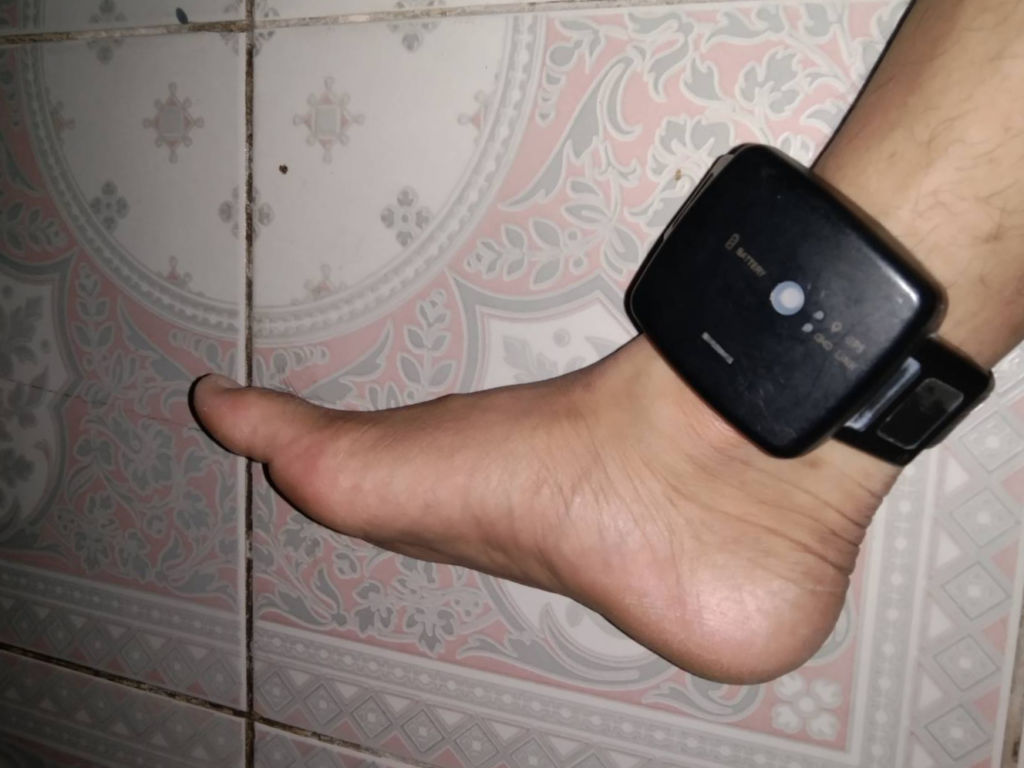
A 36-year-old Chinese national was recently arrested in Chonburi province and accused of tricking Thais to Cambodia and forcing them to run cyber scams.
Last week, 33-year-old Chinese national Huang Tianyong was arrested in Bangkok on charges of human trafficking and forced labor. He was among 19 suspects who allegedly lured Thai people in Tak’s Mae Sot district to run online scams at a building registered under the name Jin Xin Holdings just across the border from Thailand in Myanmar.
Part One: Chinese scammers hold ‘thousands’ of Thais captive in Cambodia: police
There, the southeastern border town of Myawaddy recently became a trafficking hub where arms are smuggled, the drug trade has mushroomed, and a steady influx of shady Chinese investors are building illegal casinos amid a new Chinatown.
Gen. Surachet Hakphan, aka “Big Joke,” who leads the police force’s anti-trafficking and rescue efforts, acknowledged that the problem has shifted to other countries – including Thailand.
“When government officials are strong and not corrupted, these scam syndicates will not settle in that country, but they will relocate to others,” Surachet said of the Chinese suspects arrested in Thailand. “But whenever the authorities become weak, these syndicates will come back.”
Another nearby active hotspot, according to Jaruwat Jinmonca, cofounder of a Lutheran group that aids trafficked people, is the infamous Kings Romans casino in Laos.
‘Terrified for my life’
A few days after she signed on, Dew was picked up by a pickup truck and taken across the Thai-Cambodian border to the DV Casino in a seaside city called Sihanoukville that’s become an outpost for Chinese organized crime. That was when she became suspicious that she might have been tricked.
“It was nothing like I was told,” she said. “They took me to the upper floors of the casino, which was completely sealed. No one could get in or out without permission. They seized my identification card and my phone right away.”
There she met other Thai nationals fooled by the surge of fraudulent job ads on social media seeking an “admin,” “marketing” or “salesperson” for well-paid positions with perks like free food and accommodations.
The scammers were aided by the rise of data-driven online advertising, a technology allowing them to reach large numbers of victims by targeting Thai job seekers.
Dew was trapped inside the casino for three months. She was instructed to target Thai men through dating apps, like Tinder, and lure them to invest in nonexistent business ventures.
“They gave me a phone and a computer, which already had a fake profile of a good-looking, smart woman. I was forced to talk to men and lure them into transfering money,” Dew said.
If she refused to do so, she was abused.
In details that corroborate the same torture described by fellow victim Nop, she said that her captors would shock her with an electric baton.
One time, when one of her friends announced on Facebook that Dew was missing, she was forced by the Chinese gang to call home and ensure her family that she was safe. The call was strictly monitored by a guard holding an electric baton, she said, ready to shock her if she tipped off her family that she was in danger.
“I was terrified for my life,” Dew said. “I saw them torturing other Thai people and I really believed that some of them were already killed.”
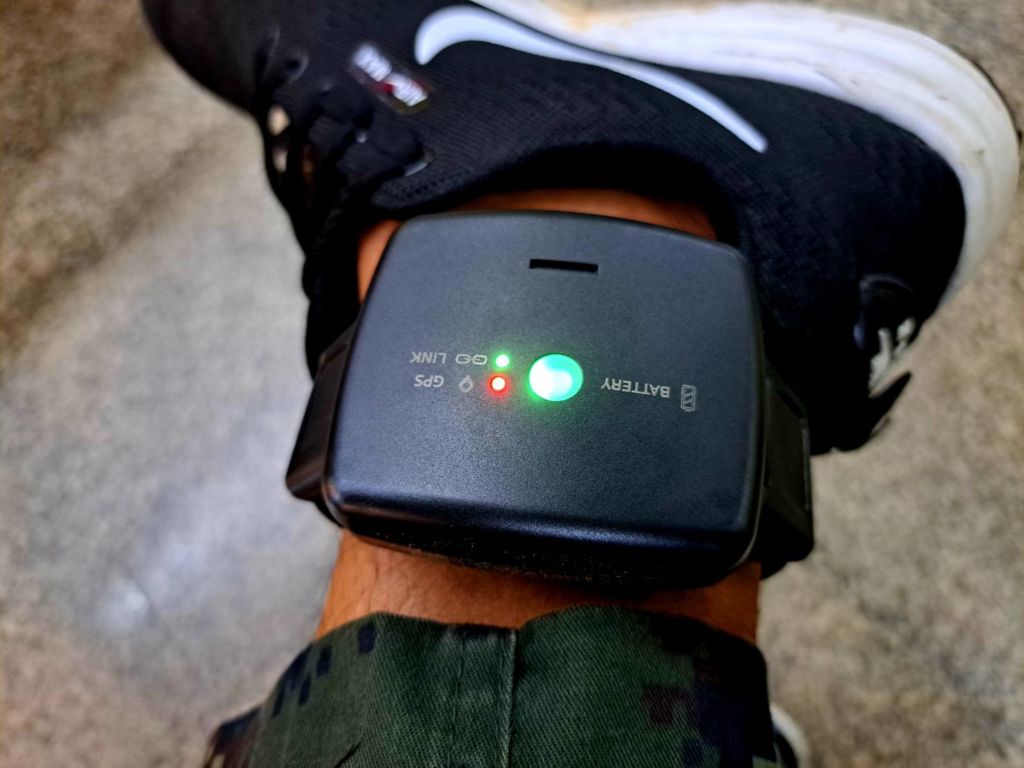
Dew and Nop were among 94 Thais rescued by Thai police and returned to Thailand on July 29. Dew said that as soon as she arrived in Aranyaprathet on the Thai side of the border in Sa Kaeo province, she was put in handcuffs:
“That moment, my status changed from a trafficking victim to a criminal.”
Dew sought help from the Social Development and Human Security Ministry to clear her name. She went through an interview that did not exonerate her.
“[The ministry] said I did not look like a victim because I willingly rode the pickup truck across the border without paying a single baht,” Dew said. “Now I’m trying to seek another screening process from the Department of Special Investigation.”
Dew said since her phone was seized since the first day she arrived in Cambodia, she does not have photos to prove her experience being trafficked. She only hoped that the court would grant a fair trial to her and other victims.
“In the end, I want all of us to be acquitted,” Dew said.
High price of justice
While desperation may have made the victims more vulnerable to being trafficked, it now risks denying them justice and returning them to captivity.
Nop remained free on a THB100,000 bond – money he said his mother and aunts borrowed money from others but don’t know how to repay.
On Oct. 25, the Criminal Court agreed to review his case, but only if he paid another THB100,000 bond – an amount they could not afford.
“We’ve been in debt. How could we have the money?” Wong said in court with tears in her eyes and hands trembling upon learning of the hefty cost.
In the end, she had to write a letter asking for mercy, and the court permitted her son’s freedom so long as he wore an electronic monitoring device instead.
“They charged my son for money laundering, but they could have checked our financial statements or sent someone to our home to see how we’re living,” she said afterward.
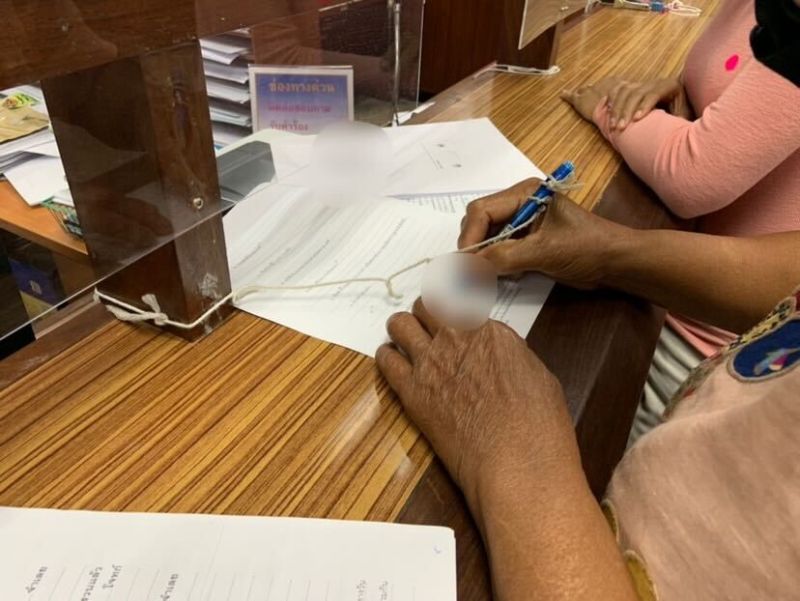
Nop is Wong’s only son. His father died nearly 20 years ago. They are farmers in Sukhothai’s Si Satchanalai district.
Both Dew and Nop will have to travel back to the court again on Nov. 28 for their next hearing.
New shores, fresh victims
According to Jaruwat, whose Immanuel Foundation has helped win the release of Thais held by scammers abroad, many of those who remained in captivity were forcibly moved from call centers in Cambodia to Myanmar overland through Thailand.
Jaruwat is convinced that some of the masterminds roam free in Thailand.
But now he believes hundreds of Thais are being held further out of reach, in the tropical archipelago of the Philippines.
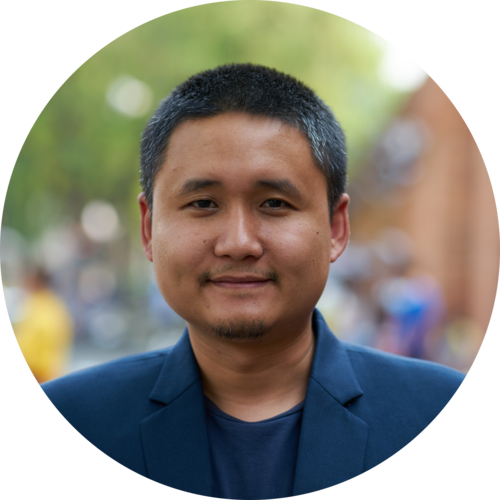
“This year alone, we have been contacted and asked for help from 300 to 400 Thais living in the Philippines,” Jaruwat said. “Many of them said that they are trapped in Island Cove.”
The Island Cove Wildlife Sanctuary is located in Cavite, a province outside Metro Manila. It’s a 36-hectare property that in 2018 was sold to wealthy Chinese-Filipino investors who transformed it into an offshore gaming hub.
A veteran human rights advocate said Thai authorities need to urgently investigate the reports of trafficked Thais being moved to other neighboring countries.
“The Thai government was asleep for a long time on this issue and only recently started to wake up to the massive scale of these cyber-scam operations in the bordering nations of Cambodia, Laos, and Myanmar,” said Phil Robertson, deputy Asia director for Human Rights Watch.
Police in Sa Keao, a province bordering Cambodia, told Coconuts on Friday that the past few months saw a significant drop in the number of Thais trafficked to Cambodia.

“We have received fewer requests for help from Thais in Cambodia recently,” said Kritsana “Capt. Petch” Eiamsa-ard of Sa Keao Police.
Kritsana said Thai and Cambodian officials have made joint efforts to arrest scam gangs in Cambodia. But this doesn’t mean putting their masterminds behind bars. Many are believed to have relocated to other vulnerable countries.
“Most of the rescue requests we get these days are from Thais in Myanmar,” Kritsana said. “There is also a new wave of trafficked Thais in Brunei who said they were promised work, like in massage, but they ended up being sex workers.”
Identify victims, acquit them
While Thailand’s police vow to bring victims of human trafficking home, it has become clear that occasional rescue missions are not enough. Post-rescue assistance and witness protection are equally necessary.
Jaruwat said his foundation this year has helped exonerate more than 300 Thai trafficking victims in conjunction with the DSI and Social Development and Human Security Ministry, who help screen and identify victims

“Since March, 347 Thais have been acquitted,” Jaruwat said.
Robertson said those who are victims should not be re-victimized at home.
“The government should recognize those rescued as trafficking victims who should not face prosecution for the crimes they were forced to commit while enslaved,” he said.
Then there remains the question of how far law enforcement is willing to go against the well-connected and wealthy perpetrators.
“Leaders need to acknowledge the situation, and law enforcement and justice agencies need to step up to ensure that organized crime groups are not operating with impunity in this region,” said Rebecca Miller, regional coordinator for the U.N. Office on Drugs and Crime. “The non-punishment principle needs to be applied as a rights-based response and critical safeguard for victim protection.”

Combating the regional trafficking’s exponential growth, Robertson said, calls for collective, transformative action. National budgets should be allocated to invest in eradicating human trafficking, educating the public, pressuring neighbors, and putting scam syndicates behind bars.
“Raising the cost to governments in terms of international cooperation and reputation has to be part of the solution to end the impunity these syndicates enjoy,” Robertson said. “Shutting down infrastructure inputs like cellular phone service and electricity from Thailand to the scam-center enclaves on the Burmese side of the Thai-Myanmar border is another key step needed to demand the cyber slaves be freed.”
